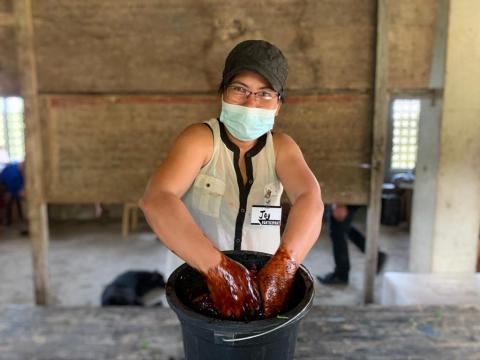A training participant prepares her concoctions for the fermented plant juice
Bohol - Accordingly, indigenous people have been practicing sustainable agriculture since time immemorial. Indispensably, it is important to further educate members of the indigenous community on the updated organic vegetable production.
The Eskaya – also known as “Visayan-Eskaya”, is an indigenous tribe found in the environs of the towns of Duero, Guindulman, Pilar and Sierra Bullones in Bohol province. The tribe was established in the 20th century and is currently settling at Biabas, Guindulman. Accordingly, this tribe can only be found in Bohol province. Eskaya has their own unique cultural heritage, uses a distinct language and literature, and has traditional practices that dates way back to pre-Spanish times.
Between 20 – 22 April 2021, 18 vegetable farmers, from the Eskaya tribe together with some agricultural extension workers, participated in the 3-day training on Organic Vegetable Production. The training was conducted in the Eskaya Tribal House, Biabas, Guindulman, Bohol. The training aims to enhance the knowledge, attitude and skills of indigenous people on the new technologies developed for organic vegetable farming, and help boost their interest to revive the organic vegetable industry in their respective localities.
The training was facilitated by Ma Gracia S. Pungay, Project Officer, and assisted by Maryjane Flor Patulilic as member of the training management team. Experts from the Agricultural Training Institute Regional Training Center – 7 were the resource people: Andrew Macaambac, Merigine C. Otara and Jorge F. Trinidad.
“My insight after the training is that I should apply all my learnings at home and help support in mitigating the effect of climate change. Further, organic production of vegetables will help save expenses for my family. Organic farming will also lead to good health. Hopefully, through the continuous support from different agencies including the Department of Agriculture, we will be able to sustain our farming.” This is what Celsa Portrias, one of the participants, stated when she was asked to present her learnings and insights during the training.

